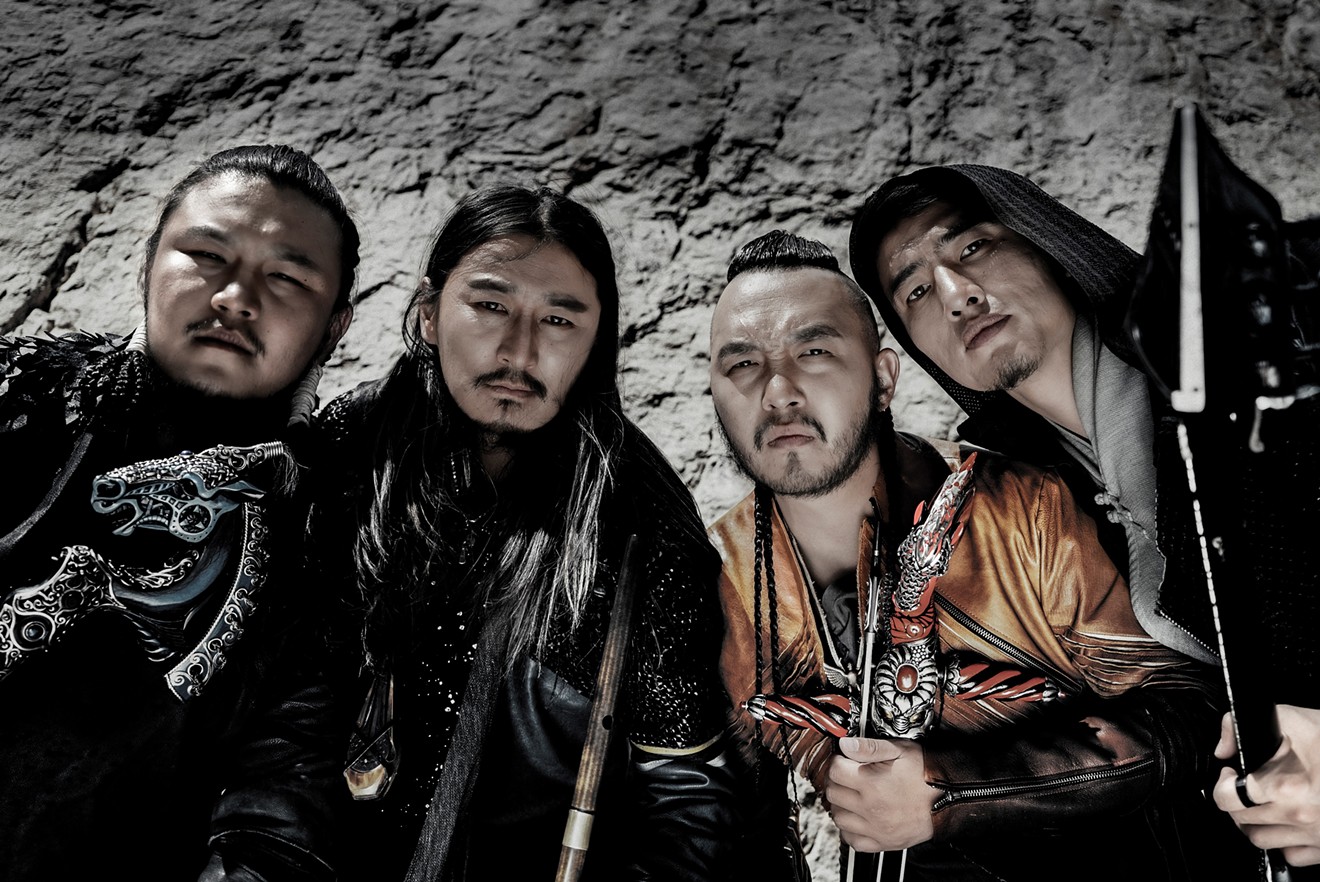The members of The Hu are badasses. That much is clear.
Combining traditionally Mongolian sounds — throat singing and the two-stringed morin khuur horsehead fiddle — with the bass, beats and production techniques of modern rock, the four-piece band from Ulaanbaatar has a distinctive beefy sound that lends itself to energetic fist-pumping.
The Hu conquered YouTube with its “Wolf Totem” video, in which the bandmates wore leather, rode motorcycles and chanted their infectious minor-key melodies over the Central Asian plains. Their guttural tones have stirred up the mosh pits at the U.K.’s Download Festival, and Germany’s Rock am Ring. And currently the Hu is destroying the Billboard charts, where it recently reached the number-one position in the Hard Rock Digital, Top New Artists and World Albums categories.
The members of the Hu are self-professed disciples of Chinggis Khaan, aka Ghenghis Khan, the Mongolian ruler who conquered more cities in 25 years than the Romans did in 400, and is supposed to have said that the greatest happiness in life is born from crushing one’s enemies.
But the Hu wants you to know that despite all of this conquest stuff, what they really stand for is reverence and respect: for the Earth, for other people, and especially for our ancestors.
“We want to tell the world how important it is to protect nature, and this beautiful Earth” says Galbadrakh Tsendbaatar, aka Gala, the Hu’s lead vocalist and morin khuur player, speaking for the band. The bandmates speak little English; their manager translates.
“Our music...actually originated by our ancestors trying to imitate the sound of water and wind," Gala says. "It’s just the way we humans connect to the Earth, because we are all together, and we should be taking care of this world we live in.”
The video for “Yuve Yuve Yu,” one of several songs about the importance of reverence for one’s ancestors, underscores the point with dramatic vistas of the rugged Altai Mountains of western Mongolia. “We wanted to show the world why it’s important to protect [nature]...instead of destroying it.”
Likewise, says the band, we should understand songs like “Wolf Totem” allegorically. The lyrics describe preparing oneself for combat (“If lions come, we’ll fight until the end/If tigers come, we’ll fight and battle/If humans come, we’ll fight and obliterate”), but the message is “about being a warrior and accepting a challenge, and coming out as a winner," explains Gala, “We believe that every person has a warrior in her or him. We’d like to inspire, to wake that warrior up with our music, so that everybody will have courage to be strong, to be united, and stand against all the injustice in the world, to do something good for the world.”
As for the Hu's relationship to Khaan, it’s complicated. The bandmates understand the historical figure’s reputation for ruthlessness. But they also emphasize his role in unifying disparate peoples and making innovative changes to Mongolian society.
“As Mongolians, we revere and respect Chinggis Khaan, as he is considered the founding father of the country, just like George Washington in America," Gala says. "In the West, he’s known as this warlord, and a conqueror, but he was also a visionary man who brought so many things, like the world’s first postal service.”
The band’s recently released album, The Gereg, further illustrates the Hu's affinity for Khaan. The title refers to the passport issued under Khaan’s rule to ensure safe passage for diplomats.
“A person who held [the passport],” says Gala, “could travel to many nations without any harm. That’s why we named our album Gereg, so we can travel to any nation without restrictions. And we want everyone to understand what [Khaan] has done for the world.”
Reverence for Mongolian ancestors drives the Hu’s musical choices as well. Ancient Mongolian instruments like the morin khuur “have been played by our ancestors for thousands of years,” but also happen to be tuned in a manner similar to a guitar, “so it’s easy for us to blend our traditional music with Western rock music,” Gala says.
Likewise, the throat singing that gives the vocals their distinctive power is a talent dutifully received from their ancestors.
“We’ve been doing this so long, even though we are young, and it’s in our blood," says Gala. "It comes from the deepest and honest place of our heart, and respecting our ancestors."
The Hu plays at 8 p.m. Thursday, October 3, at the Oriental Theater, 4335 West 44th Avenue. Tickets are $18 to $150 and available at the Oriental Theater website.
[
{
"name": "Air - MediumRectangle - Inline Content - Mobile Display Size",
"component": "12017618",
"insertPoint": "2",
"requiredCountToDisplay": "2"
},{
"name": "Editor Picks",
"component": "17242653",
"insertPoint": "4",
"requiredCountToDisplay": "1"
},{
"name": "Inline Links",
"component": "18838239",
"insertPoint": "8th",
"startingPoint": 8,
"requiredCountToDisplay": "7",
"maxInsertions": 25
},{
"name": "Air - MediumRectangle - Combo - Inline Content",
"component": "17261320",
"insertPoint": "8th",
"startingPoint": 8,
"requiredCountToDisplay": "7",
"maxInsertions": 25
},{
"name": "Inline Links",
"component": "18838239",
"insertPoint": "8th",
"startingPoint": 12,
"requiredCountToDisplay": "11",
"maxInsertions": 25
},{
"name": "Air - Leaderboard Tower - Combo - Inline Content",
"component": "17261321",
"insertPoint": "8th",
"startingPoint": 12,
"requiredCountToDisplay": "11",
"maxInsertions": 25
}
]












